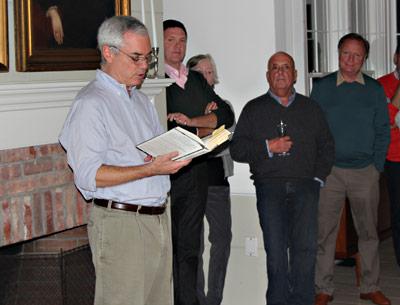One for the Books, and the Library, Too

Each year since 2006, the John Jermain Memorial Library in Sag Harbor has held One for the Books, a literary-themed fund-raiser. Up until this year, the idea was that various hosts would serve dinner and a book chosen by the event committee would be discussed (between tidbits of local gossip). To add a smidgen of intrigue, guests chose the book they wanted to discuss first, and only then was the host’s identity revealed. The books could be any kind: old, new, obscure, whatever.
This year that formula changed. On the two nights of this year’s event, last Saturday and again this Saturday, only the books of local Sag Harbor writers were chosen, and the authors themselves showed up to mingle with guests. Instead of a sit-down dinner, the format has switched to a cocktail party, the better to meet and greet both old and new acquaintances, as well as the authors.
E.L. Doctorow, whose “Homer & Langley” was published in 2010, was the star attraction at the home of Ann Sutphen and David Rhoades. Their house — built by Charles Payne, a sea captain whose portrait, along with his wife’s, still hangs in the living room — has been in Ms. Sutphen’s family for six generations. When her daughter, now 9, takes possession, that number will rise to seven. Ms. Sutphen and family spent the last three years cruising from Seattle to Sag Harbor by way of the Panama Canal, arriving here, where they plan to stay, in September.
Asked why he supported the library, Mr. Doctorow replied, “The library is part of the national defense system, as important as missiles and F-35s.” His latest book, “Andrew’s Brain,” will be published in January. The filmmaker D.A. Pennebaker, one of the guests, also feels strongly about the library. “If you can’t get to a film,” he said, “read a book.”
At the village house of Bob Weinstein and Eric Henley, a branding professional and flight attendant respectively, David Margolick, a contributing editor to Vanity Fair, read from his biography, “Dreadful: The Short Life and Gay Times of John Horne Burns,” published in June. Mr. Margolick explained that he’d had the idea to write about his subject, a tragic figure who drank himself to death in Florence in 1953, for many years. Mr. Burns, Irish Catholic and a closeted homosexual, was turned down to teach at many prep schools including Andover and Choate.
Mr. Margolick, who attended the Loomis School, was “quite proud” that his alma mater had hired the writer, many years before Mr. Margolick’s tenure there. Alas, the ungrateful Mr. Burns wrote a book trashing Loomis, which was enormously successful, at least among critics and his fellow authors. Mr. Margolick read an excerpt from “Dreadful” describing how Mr. Burns had slipped away from the school in the dark of night after his novel was published.
After the reading, Mr. Margolick signed copies of his book. He was gratified, he said, to be able to “give back to Sag Harbor. . . . these guys are doing me a favor. I’ve only been able to take.” After the assembled clapped for his reading, he remarked, “I felt like applauding everyone here.”
Suzanne McNear, who last December published her first novel, “Knock Knock: A Life,” was celebrated at the house of her daughter and son-in-law, Alex McNear and Robby Stein. Eric Fischl, who will be the guest of honor at his own event on Saturday at the home of Susan Mead, was there to support Ms. McNear. Mr. Fischl declared that he is “an absolute fan of Suzanne. I love her book . . . it’s magical. Her sense of evil in the world is profound.”
Ms. McNear, who described “Knock Knock” as a “fictional memoir,” said she would “never have written it as a memoir.” That would have been “uninteresting,” she said, though she admitted that much of the material was sourced from her life. Writing in the third person, she said, gave her a “lot more freedom.”
